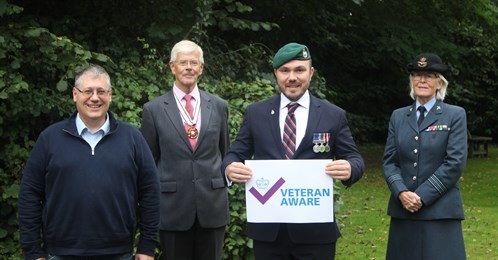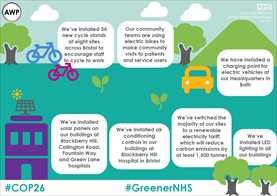Publish date: 13 July 2021
Avon & Wiltshire Mental Health Partnership NHS Trust is on course to reduce its annual carbon emissions by 565 tonnes and make an annual saving of £243,000 on its energy costs.
We have achieved this by undertaking a series of infrastructure refurbishment projects, including a new Building Energy Management System (BEMS), LED lighting replacements, improved pipework insulation, electric heating, air conditioning compressor controls as well as the installation of solar PV and Air Source Heat Pumps (ASHP).
The Trust used £24,300 from the Public Sector Low Carbon Skills Fund (LCSF) provided by Salix Finance to establish the feasibility of the BEMS, LED, Solar PV and ASHP project proposals.
Technical surveys were carried out to identify energy savings resulting from the installation of the various technologies.
Following this process, the Trust then bid and was awarded a £4.5 million grant from Salix through the Public Sector Decarbonisation Scheme to complete the project.
Luke Champion, Energy and Sustainability Manager at the Trust, said: "We have always been keen to improve the way we use our energy, not only because we want to do our bit to be more sustainable - but also because saving money is a big motivational factor."
The Trust is now on track to, not only achieve the Government's net zero carbon emissions target by 2050, but is also hoping to reach it earlier by 2030.
The projects carried out so far have allowed the Trust to make approximately 30% of its estate more energy efficient. The most energy intensive buildings were focused on, including inpatient wards and other buildings which were high energy users.
Luke Champion added: "We focused on the buildings which use the highest energy, primarily our inpatient units and also office buildings where the consumption is generally high, or where there was an older less energy efficient technology that needed to be replaced.
"On one of the smaller sites, we still had electric storage heaters from the early 1990s, so instead of maximising the number of sites we could cover with the funding, we favoured those energy intensive sites and replaced them with energy efficient alternatives. It's about the proportion of energy saved long-term."
This is the first time that the Trust, which provides community and inpatient mental health services across Bath and North East Somerset, Swindon, Wiltshire, Bristol, North Somerset and South Gloucestershire, has had a chance to complete a granular review of its buildings, having previously upgraded a proportion of their lighting to LED and installed solar PV in the 2000s.
Sameen Khan, Programme Manager at Salix, said: "It's been great to see the Trust committing to energy reduction over the years and the grant is just the capital they needed to take the next steps towards energy efficiency and decarbonisation.
"With the support from Salix, Luke and his team will be able to take this from commitment to completion. This has been achieved whilst they have also had to deal with the numerous challenges during the Covid pandemic."
Avon & Wiltshire Mental Health Partnership NHS Trust also involves its staff when it comes to becoming greener. Its sustainability group encourages members of staff to contribute and give feedback.
"Our staff are really passionate about the role we can all play in reducing carbon emissions, not just at work but in our personal lives too. We have established a sustainability group, which meets regularly to look at and implement the creative ideas our staff are proposing.
"Sustainability group members presented the case for our Trust to declare a climate emergency and to achieve net zero emissions by 2030.
"We all recognise that by making small changes to the way we work, we can make a significant difference to our environmental impact."
In addition to the infrastructure projects, the Trust has switched all its sites to a renewable energy electricity tariff and has introduced 28 electric bikes for community teams and staff to use, as well as its first twin charging point for electric cars.
It has also adopted digital technology to enable staff and patients to take part in virtual meetings and appointments, which was essential during the pandemic but is set to stay in place to reduce unnecessary travel.
Luke also reports a lot of positive comments on the Trust's successes and has been able to share them with other mental health trusts who share the same challenges when trying to secure funding for carbon reduction projects.




